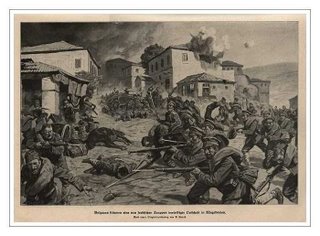 Keywords: World War I
Keywords: World War I"Wars are primarily about fighting and killing, but it would be a great oversimplification to state that that is all they are about. Quarrels between nations and groups of people do indeed produce misery and suffering for all those willingly or unwillingly involved, but thankfully there is much more to study and learn about the great conflicts of our time than merely the violence and destruction they caused.
Wars can set about vast changes in society, be switching points in history, can be begetters of social movements and the origin of future problems. They are also prime movers in bringing about innovation and new and different ways of doing things and of organizing society.
When looked at in that light, the Great War of 1914-1918 can justly be considered to be the pivotal event of the 20th century. Essentially, both the conflicts that lay at the origin of the Great War as well as the newly created enmities resulting from the Great War remained unresolved and led to a continuation of the great struggle of nations some 20 years later. Bolshevist Revolution and Cold War, Fascism and the creation of new nations and Nationalisms, all these are unintended consequences of the War of 1914-1918. Many of these problems are still with us to this day, the break-up of former Yugoslavia into ethnic divisions being but one glaring example."
Source: The Great War in a Different Light
Discuss:
World War One - Myspace
See also:
Image of the Day: The Heritage of the Great War - The World 2 Come
Photo of the Day: World War 2 Pictures In Color - The World 2 Come
No comments:
Post a Comment